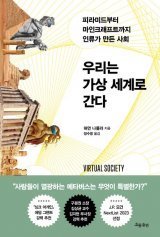Did the Metaverse exist in ancient times?
Did the Metaverse exist in ancient times?
Posted September. 23, 2023 08:06,
Updated September. 23, 2023 08:06

“The reason the ‘Shroud of Turin’, believed to bear the image of Jesus, holds and unimaginable value is because society has bestowed upon it a special significance – a faith towards another world beyond this cloth. In some ways, the Shroud of Turin is like the digital art we find hard to understand today. A world accessed through religious imagination might be more similar to one accessed via Wi-Fi- than we think.”
This book provides a humanities-based examination of the increasingly popular concept of the metaverse. When people hear "metaverse," many vaguely understand it as a type of online game. However, the author suggests that humanity has been creating metaverses since time immemorial using just language and imagination.
The Göbekli Tepe archaeological site in Turkey, constructed over 10,000 years ago, is an archetype of the metaverse. Over a millennium, this site, carved from massive rocks, boasts of mythical symbols ranging from scorpions and roaring beasts to flying eagles and headless human figures. In ancient times, virtual worlds existed because people believed in events, identities, rules, and objects being real. These worlds communicated values continuously with real-world societies, enhancing individual and societal wealth, satisfaction, and meaning. Naturally, one can discern the criteria for a good metaverse today, which is one that "satisfies users' intrinsic motivation and autonomy, allows ample interaction with others, and facilitates value exchange with the real world."
The author predicts that within the 21st century, we'll see the emergence of a post-human society where computer and neural connections are direct. People will possess perceptual abilities surpassing physical limitations. It is anticipated that individuals will lead multifaceted lives across thousands of virtual worlds, each more intricate than reality. As expected from a book penned by the co-founder and CEO of Improbable, a global virtual reality software company, the discussion on the metaverse is grounded in scientific evidence and offers diverse societal reflections.
Jong-Yeob JO jjj@donga.com
Headline News
- Joint investigation headquarters asks Yoon to appear at the investigation office
- KDIC colonel: Cable ties and hoods to control NEC staff were prepared
- Results of real estate development diverged by accessibility to Gangnam
- New budget proposal reflecting Trump’s demand rejected
- Son Heung-min scores winning corner kick







